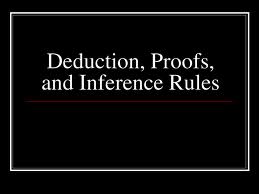Sponsored Links
Notes on Natural Deduction
 WE HAVE TO USE the appropriate rules of inference in constructing formal proofs of arguments’ validity depending on the kind of propositions they use. The following are some basic techniques in properly constructing proof of validity of arguments.
WE HAVE TO USE the appropriate rules of inference in constructing formal proofs of arguments’ validity depending on the kind of propositions they use. The following are some basic techniques in properly constructing proof of validity of arguments.1.Always begin by identifying the conclusion and attempting to look for it in the premises.
2. If the conclusion is a letter that appears in the consequent of a conditional statement in the premises, consider obtaining it through modus ponens.
3.If the conclusion is a negative statement (negated letter) that appears in the antecedent of a conditional statement in the premises, consider getting it using modus tollens:
4. If the conclusion is a conditional statement, consider obtaining it via hypothetical syllogism:
5.If the conclusion is a letter that appears in a disjunctive statement in the premises, consider getting hold of it via disjunctive syllogism.
6. If the conclusion contains a letter that appears in a conjunction in the premises, consider obtaining that letter via simplification...
7. If the conclusion is a conjunctive statement, consider obtaining the individual conjuncts first and then combining them via conjunction.
8. If the conclusion is a disjunctive statement, consider obtaining it either through addition or constructive dilemma.
9. If the conclusion contains a letter not found in the premises, addition mustbe used to introduce that letter.
10. Consider using conjunction to set up constructive dilemma and destructive dilemma. (Related: What is Moral Dilemma (And the Three Levels of Moral Dilemmas))
11. If the conclusion is a disjunctive statement consisting of two negated letters, consider using destructive dilemma.
12. If the conclusion is a conjunctive proposition and there’s a conditional statement in the premises which contains the letters in the conclusion, consider using absorption.
Remember too that the order of the premises does not affect the argument’s form. Keep in mind also that negative statements (negated letters) can be substituted in place of the P, Q, R and S of an inference form just as can affirmative statements.
Sample Exam:
Translate the following arguments into symbolic form and use the first four rules
of inference to derive the conclusion of each. The letters to be used for the simple statements are given in parentheses after each exercise. Use these letters in the order in which they are listed.
1. If the assassination of terrorist leaders violates civilized values and also is not effective in the long run, then if it prevents terrorist atrocities, then it is effective in the long run. If the assassination of terrorist leaders violates civilized values, then it is not effective in the long run. The assassination of terrorist leaders violates civilized values and is also illegal. If the assassination of terrorist leaders is not effective in the long run, then either it prevents terrorist atrocities or it justifies acts of revenge by terrorists. Therefore, the assassination of terrorist leaders justifies acts of revenge by terrorists and also is not effective in the long run. (V, E, P, I, J )
2. If either manufacturers will not concentrate on producing a superior product or they will not market their product abroad, then if they will not concentrate on producing a superior product, then the trade deficit will worsen. Either manufacturers will concentrate on producing a superior product or the trade deficit will not worsen. Manufacturers will not concentrate on producing a superior product. Therefore, today’s business managers lack imagination. (C, M, T, B)
3. If either medical fees or malpractice awards escape restrictions, then health care costs will soar and millions of poor will go uninsured. If the lawyers get their way, then malpractice awards will escape restrictions. If the doctors get their way, then medical fees will escape restrictions. Either the doctors or the lawyers will get their way, and insurance companies will resist reform. Therefore, health care costs will soar. (F, A, H, P, L, D, I )
4. If we are less than certain the human fetus is a person, then we must give it the benefit of the doubt. If we are certain the human fetus is a person, then we must accord it the right to live. If either we must give the fetus the benefit of the doubt or accord it the right to live, then we are not less than certain the fetus is human and it is not merely a part of the mother’s body. Either we are less than certain the human fetus is a person or we are certain about it. If we are certain the human fetus is a person, then abortion is immoral. Therefore, abortion is immoral. (L, G, C, A, M, I )
5. If Fred plays computer games more than five hours per day, then either his ingenuity is developed or he becomes conditioned to expect unreal excitement. Fred’s ingenuity is not developed by playing computer games. But Fred does play computer games more than five hours per day. Therefore, Fred is conditioned to expect unreal excitement (P, I, C).
How to cite this article:
Notes on Natural Deduction @ www.OurHappySchool.com




